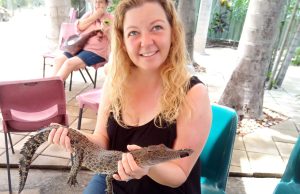Rebecca Hardwick undertook a PhD at PenARC and is now a Senior Research Fellow working on the Mental Health Research Initiative (MHRI). This NIHR funded initiative aims to develop mental health research that matters to the people and places of Southwest England as well as to build up the skills and confidence of people working in local services to get involved in and use research. In this blog for NIHR’s Your Path in Research Campaign she tells us about her research path and the far-reaching places it has taken her.
Starting out in research
My PhD research, “How do Third Sector Organisations use research and other kinds of knowledge in their work?” was inspired by my experience of working in the voluntary sector and a curiosity to understand which types of knowledge voluntary and community organisations prefer to work with. This remains one of my enduring research interests. My PhD research was the launchpad for my first Research Fellow post and I’m already finding resonance in the work I’ve been doing with MHRI, so I’m hopeful of extending and developing my findings. I want to see my research being useful to people.
Putting my research into practice and learning what matters
My plan is for my research career to develop in ways that are tuned in to what matters to people, and that will improve outcomes for communities, whatever shape or form that might take. For example, I’m collaborating with people in a local public health team to support the development of their research and evaluation skills, with a view to doing some work together down the road. But I’m also a realist methodologist for an Australian Research Council funded evaluation for Indigenous Language Centres at Charles Darwin University in the Northern Territory, Australia, where I’m an Adjunct Research Fellow.

Reflecting on my research journey and the importance of supporting others
I believe that as researchers we have a very particular set of skills which are there to be used for the benefit of people and communities, and the organisations that serve them – we are not as important as we sometimes think we are, but we can be useful with our skills and knowledge. I’d recommend a research career to anyone who is curious about the world, society and people and is motivated by wanting to help make the world a better place, but who is realistic about research-based knowledge being only one way of effecting change.
“I’d recommend a research career to anyone who is curious about the world, society and people and is motivated by wanting to help make the world a better place.”
Supporting and developing PhD students is really important to me. Because I finished my degree relatively recently (2019), I have very vivid memories of what it’s like and think this is valuable to my students. I am also now a lot more sympathetic about the range of pressures that were on my supervisors and have needed to apologise for not managing to review a paper draft, or for having to miss a meeting and reschedule. I was given lots of excellent advice from senior academics when I was at Exeter. They helped me to learn the skills of the trade and showed me how to ‘be’ an academic. The best advice I was given has shaped my research career; it was to find a niche, and become known for it, develop your skills and knowledge and work hard at it. For me, that niche is knowledge, skills and experience in realist evaluation and research. So far that advice has meant I’ve lived and worked in Australia, conducted fieldwork in Tonga, Indonesia, Uganda and Kenya, chaired an international conference, presented at a conference in Canada, been invited to co-author methodological papers in the UK and Australia and acquired two PhD students – all helpful in ticking boxes for promotion, but more importantly, all very much aligned with my personal philosophy for being a useful human.
Learn more about the Peninsula Mental Health Research Initiative (PenMHRI) and how you can get involved.
*
